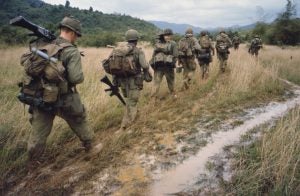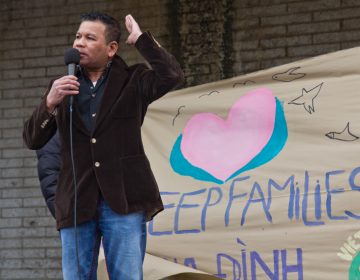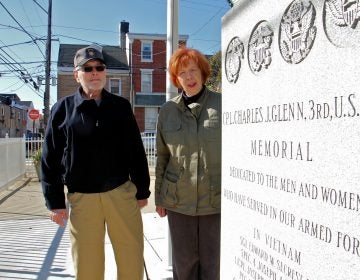Looking back at the war won’t distract me from Vietnamese community’s future
I don’t feel confused about the Vietnam War. I am certain that my life is a result of it. And I have dedicated the last eight years of my life to the future of my community.

A young girl works in a community garden. (Courtesy of VietLead)
This story is part of a WHYY series examining how the United States, four decades later, is still processing the Vietnam War. To learn more about the topic, watch Ken Burns and Lynn Novick’s 10-part documentary “The Vietnam War.” WHYY members will have extended on-demand access to the series via WHYY Passport through the end of 2017.
—
These days, I don’t feel very confused about the Vietnam War. I used to, as someone whose life, presence, and identity in the United States has always felt somewhat off-kilter.
I grew up in Houston, Texas, a child of refugee parents. I grew up in playgrounds of brown and black children, all confused slightly at how we all got here, how we’re all supposed to get along. And no wonder that we couldn’t. We weren’t necessarily taught to see humanity in each other either. We all spoke in different tongues, but were made to feel ashamed because our English accents were not crisp. We at least had that in common.
In my household, even though I could not speak Vietnamese as well as my parents wanted me to, I knew the language of silence and resentment very well. The language of things we wanted to express, but didn’t know how to. The language of survival in this place — new to my parents, the only place I knew for myself. My mother sold bitter melon grown in our backyard and aluminum beer cans to help make ends meet. I remember hot days in Houston lugging large plastic bags filled with cans. The smell of old beer clung on long after the cans were gone.
Today is the repercussion of yesterday. If we cannot find peace in this lifetime, it was because we failed miserably in the last lifetime. This is how my mother explains her situation as a Buddhist. But I, as a realist, think that what we contend with today is directly related to the choices, decisions, policies, and wars of yesterday.
A fellow college student asked me once what percentage of me is Vietnamese, because I grew up in the United States. My body heaved at the injustice of the question. I felt indignant that I had to be “part” anything, rather than many “wholes.” But I wonder if being a person of color in the U.S. means that you are only allowed “parts” of yourself in any space.
I used to be confused about the war — about which side my family fought on. My father was a South Vietnamese soldier, and he had to go to the re-education camps and labor for three years after 1975. When he was released, he escaped by boat, as did my mother a few years after him. Everyone feared the Communists. I grew up physically embodying their pain and trauma. I honestly didn’t realize this until I visited Vietnam for the first time and felt genuine fear when seeing the red flag with the yellow star that, to me, embodied all of my parents’ pain, but to Vietnamese people in the homeland, embodied their liberation.
Because I work in the U.S. Vietnamese community, I know that the stories we have told ourselves of our history also validates the choices we made. Therefore, my elders in the U.S. fight for their truths, because they are tied to their dignity and sense of self-worth. To them, Vietnam is not liberated. I feel it is my privilege and obligation to hold space for a multitude of narratives, a multitude of truths. That in and of itself is a weight.
So, no, these days, I don’t feel very confused about the Vietnam War. I feel completely certain that my life is a result of it. I have dedicated the last eight years of my life to community organizing, service provision, and leadership development out of this certainty.
I have returned to Vietnam a half-dozen times now, visiting my mother’s seven brothers and sisters. We speak in half-sentences — half Viet, half English. My cousins and I marvel at our differences; they joke that fate has cleaved our families in half.
I say, no, it was war. War is not fateful, karmic.
They laugh and say that war is the game of men whose sons did not themselves play a part.
These days, Trump and his administration are waging material and ideological wars against folks of color. The Muslim ban, the wall along the border, ending DACA, launching Operation Mega and “Safe Cities,” and the list goes on. A few days ago, 107 Philadelphians were picked up by ICE and disappeared into the night. My mother used to tell stories about how people were disappeared by the Communist authorities. Meanwhile, Vietnamese families hide their sons and daughters in shame — the ones who had committed crimes decades ago. These days these people might be deported back to Vietnam, the country their families fled. And the cycle of displacement continues.
These days, I am not confused about a war that happened over 40 years ago. I am more concerned about how to prepare our communities today for the onslaught against us. I am more concerned about building connections with other communities of color in our efforts to preserve, protect, and advance our civil and human rights. I leave the questions about the past to those who had a hand in making those decisions. My work is about protecting my community’s future.
—
Nancy Dung Nguyen is the executive director and a co-founder of VietLead, a local community-based nonprofit in Philadelphia and South Jersey.
WHYY is your source for fact-based, in-depth journalism and information. As a nonprofit organization, we rely on financial support from readers like you. Please give today.





